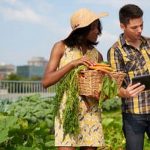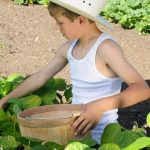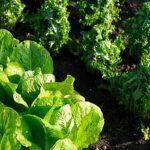The USDA is urging individuals across the country to register their vegetable gardens as part of a new initiative aimed at gathering important data for tracking and research purposes. By registering your garden with the USDA, you can contribute valuable information that will ultimately shape future agricultural policies and programs. This initiative is not only about individual gardens but also about creating a collective database that can benefit communities on a larger scale.
Tracking the number and types of vegetable gardens in different regions can provide crucial insight into food production, sustainability, and community resilience. By simply registering your garden, you are playing a significant role in building a comprehensive database that can inform decision-makers at all levels. The data collected through this initiative will help researchers and policymakers better understand the landscape of home-grown vegetables in America and its potential impact on food security.
Registering your vegetable garden with the USDA is a straightforward process that can be done online or through designated resources provided by the agency. This step-by-step guide aims to make it easy for individuals to participate in this important initiative and contribute to the greater good.
By taking this simple action, you are not only supporting research efforts but also engaging in a meaningful way with your local community and helping to shape a more sustainable future for agriculture.
Benefits of Registering Your Vegetable Garden
Registering your vegetable garden with the USDA can have numerous benefits, not just for you as a gardener, but for the larger agricultural community as well. By participating in this initiative, you are contributing valuable data that can be used for tracking and research purposes. This information is crucial for government agencies, researchers, and policymakers to better understand trends in gardening practices, food production, and sustainability efforts.
Here are some key benefits of registering your vegetable garden:
1. Data Collection: Your garden registration helps build a comprehensive database of vegetable gardens across the country. This data can be analyzed to identify patterns, challenges, and opportunities in urban and rural gardening practices.
2. Policy Impact: The information collected from registered gardens can influence future agricultural policies and programs. By providing accurate data on the types of crops grown, pest management strategies used, and water conservation techniques implemented, you are shaping the direction of agricultural support at a national level.
3. Research Opportunities: Researchers can utilize the data gathered from registered gardens to conduct studies on topics such as soil health, biodiversity conservation, and climate change resilience. Your participation directly contributes to expanding our knowledge base on sustainable agriculture practices.
By registering your vegetable garden with the USDA, you are not just documenting your personal green space – you are actively participating in a larger movement towards food security and environmental stewardship. This simple act can have far-reaching effects on how we approach agriculture in the future. So why wait? Take the first step towards making a difference by registering your garden today.
How to Register Your Vegetable Garden
Registering your vegetable garden with the USDA is a simple yet impactful way to contribute to agricultural research and data collection. By providing information about your garden, you are helping to create a comprehensive database that can be utilized for various purposes, including shaping future agricultural policies and programs. Here is a step-by-step guide on how you can register your vegetable garden with the USDA:
- Visit the official website of the USDA and navigate to the section dedicated to registering vegetable gardens.
- Create an account using your personal information, such as name, address, and contact details.
- Provide details about your vegetable garden, including its location, size, types of vegetables grown, and any environmentally friendly practices you may implement.
The USDA offers resources to assist individuals in the registration process to ensure that it is user-friendly and accessible to all. These resources may include video tutorials, FAQs, and online support forums where users can ask questions and seek guidance from experts. By following these steps and utilizing the resources provided by the USDA, you can easily register your vegetable garden and make a valuable contribution to agricultural research.
Additionally, by registering your vegetable garden with the USDA, you are also contributing to a larger community effort aimed at promoting food security and sustainability. The collective data gathered from registered gardens can benefit local neighborhoods and communities by identifying areas of improvement or where additional support may be needed.
It also allows for better planning and resource allocation to address issues related to food production and distribution within communities. So take action today and join others in registering their vegetable gardens with the USDA for a brighter future in agriculture and food security.
Privacy and Security Concerns
Addressing Privacy and Security Concerns
When the USDA is asking people to register their vegetable gardens, it is natural for individuals to have concerns about privacy and data security. However, it is essential to understand that the registration process is designed to protect personal information and ensure confidentiality. The USDA has strict guidelines in place to safeguard the data collected and prevent any unauthorized access.
Protecting Confidentiality of Garden Registration Information
The USDA takes privacy seriously and guarantees that any information submitted during the garden registration process will be kept confidential. Personal details such as names, addresses, or contact information will only be used for tracking purposes and research analysis. The data collected from registered vegetable gardens will be aggregated to maintain anonymity and protect individual identities.
Ensuring Data Security Measures
To further enhance security measures, the USDA implements advanced encryption protocols and secure servers to prevent any potential breaches. By following industry best practices for data protection, the agency aims to build trust with participants in the registration initiative. Any concerns regarding privacy or security can be addressed by contacting the USDA directly for clarification on their procedures.
Community Engagement
Engaging the community in registering their vegetable gardens is crucial for the success of the USDA’s initiative. By participating in this program, individuals can contribute valuable data that will not only benefit their own gardens but also help shape future agricultural policies and programs. The information gathered through garden registration can provide insights into trends, challenges, and successes that can inform decision-making at local, state, and national levels.
In addition to individual benefits, community engagement in registering vegetable gardens can foster a sense of collective responsibility towards food security and sustainability. Sharing data on garden sizes, crop varieties, and gardening practices within neighborhoods can create a network of support where gardeners can learn from each other, exchange resources, and work together to overcome common obstacles. This collaboration can lead to stronger bonds within communities and a shared commitment to promoting healthy living through gardening.
Furthermore, by joining forces with neighbors and fellow gardeners to register vegetable gardens, communities can amplify their impact on shaping a greener and more resilient future. The collective data collected from registered gardens can help identify areas of need for additional resources or support, advocate for policies that promote urban agriculture, and ultimately contribute to building a more sustainable food system for all.
It is not just about individual actions but also about coming together as a community to create positive change for the environment and society as a whole.
Real-Life Success Stories
Improving Crop Management
One of the success stories of registering vegetable gardens with the USDA involves improved crop management. By tracking data on what vegetables are being grown, how they are being cared for, and any challenges faced by gardeners, the USDA can provide valuable insights into best practices for crop management. This information can then be shared with registered gardeners to help optimize their harvests and increase productivity.
Supporting Food Security Initiatives
Registered vegetable gardens have also played a crucial role in supporting food security initiatives in local communities. By knowing where fresh produce is being grown and the quantity available, organizations can better distribute resources to areas in need. In some cases, surplus vegetables from registered gardens have been donated to local food banks or community centers, ensuring that nutritious options are accessible to all members of the community.
Promoting Sustainable Agriculture
Another significant impact of registering vegetable gardens with the USDA is promoting sustainable agriculture practices. By collecting data on gardening methods, water usage, and pesticide use, the USDA can identify trends and offer suggestions for more environmentally friendly techniques. Through collective efforts to register gardens, individuals can contribute to a larger movement towards sustainable food production and environmental conservation.
These real-life success stories demonstrate the tangible benefits of registering your vegetable garden with the USDA. From improving crop management practices to supporting food security initiatives and promoting sustainable agriculture, participating in this initiative can have a positive impact on both individual gardeners and their communities. Joining forces with the USDA in tracking vegetable gardens is not only a way to contribute valuable data but also a step towards creating a more resilient and sustainable future for agriculture.
Future Implications
The initiative from the USDA asking people to register their vegetable gardens has far-reaching implications for the future of agriculture and food security. By collecting data on a wide range of vegetable gardens across the country, the USDA can gain valuable insights into trends, challenges, and successes in home gardening. This information can then be used to inform future agricultural policies and programs, ensuring that resources are allocated effectively and that support is provided where it is most needed.
One of the key benefits of registering your vegetable garden is the potential impact it can have on shaping the direction of agricultural practices in the coming years. The data collected through garden registration can help identify areas where additional research or support is necessary, leading to more targeted interventions and improved outcomes for gardeners. Additionally, by participating in this initiative, individuals can contribute to a larger collective effort to promote sustainable, community-based food production.
As more and more people register their vegetable gardens with the USDA, the cumulative data obtained will provide a comprehensive overview of the state of home gardening in the US. This wealth of information can be used to identify patterns, best practices, and areas for improvement at both individual and community levels.
Ultimately, by participating in this initiative, individuals are not only contributing to a national database but also playing a part in shaping the future of agriculture and food security in their own communities.
| Key Point | Detail |
|---|---|
| Impact on Agricultural Policies | Data from registered gardens informs future policies |
| Community-based Food Production | Contribution to sustainable food production efforts |
| Data Collection Benefits | Comprehensive overview aids in identifying best practices |
Call to Action
Are you passionate about gardening and want to contribute to a greater cause? The USDA is asking people to register their vegetable gardens to help track and research the impact of homegrown produce on our communities. By registering your garden, you can provide valuable data that will shape future agricultural policies and programs.
Registering your vegetable garden is a simple yet impactful way to make a difference. Your participation in this initiative will not only contribute to the overall data collection but also have a potential impact on the development of future agricultural practices. The information gathered from registered gardens will help researchers and policymakers better understand the role of homegrown vegetables in promoting food security and sustainability.
To register your vegetable garden with the USDA, follow these simple steps: visit the official website, fill out the registration form with details about your garden such as location, size, and types of vegetables grown, and submit it online. The USDA provides resources and support to guide you through the registration process, ensuring that your information is securely recorded for research purposes.
Join us in this effort to create a comprehensive database of vegetable gardens across the country by registering yours today.
Conclusion
In conclusion, the USDA’s initiative to register vegetable gardens is a crucial step towards enhancing data collection, research, and community engagement. By encouraging individuals to register their vegetable gardens, the USDA is not only able to track important information for research purposes but also to develop future agricultural policies and programs that can benefit both individuals and communities as a whole.
The simple act of registering your garden can have a ripple effect on the future of agriculture and food security.
Furthermore, addressing privacy and security concerns is essential in ensuring that individuals feel comfortable sharing their garden registration information with the USDA. With protocols in place to protect the confidentiality of personal data, individuals can rest assured that their information will be handled with care and respect. This transparency helps build trust between participants and the organization, ultimately fostering a stronger sense of community involvement.
Ultimately, by registering vegetable gardens with the USDA, individuals have the opportunity to contribute valuable data that can lead to positive outcomes within their neighborhoods and communities. The collective effort of registering gardens can help shape the future of agriculture and ensure food security for generations to come. So, let us all take action today and register our vegetable gardens with the USDA to make a meaningful impact on our communities and beyond.

If you’re looking to get into vegetable gardening, or are just looking for some tips on how to make your current garden better, then you’ve come to the right place! My name is Ethel and I have been gardening for years. In this blog, I’m going to share with you some of my best tips on how to create a successful vegetable garden.





